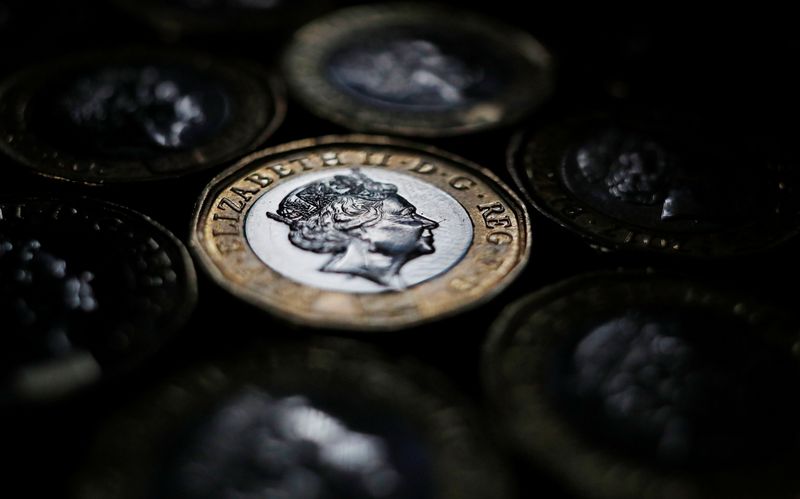By Mike Dolan
LONDON (Reuters) - Although markets have become increasingly aggressive in pricing a UK interest rate rise as soon as next May - several months at least before the United States or euro zone - sterling seems reluctant to follow.
Bank of England policymakers meet next week and, according to governor Andrew Bailey at least, they are split evenly on whether the basic conditions for lifting the central bank's main interest rate from its historic low of 0.1%.
Britain's annual inflation rate raced more than a percentage point above the BoE's 2% target in August amid pandemic-related base effects and supply bottlenecks associated with this year's economic reboot as well as Brexit disruptions. The latest numbers also show UK labour markets tightening more than expected as businesses open up and government subsidies fall away from next month, and domestic energy prices have soared.
It has been so much so that forecasters at major international banks such as Goldman Sachs (NYSE:GS), JPMorgan (NYSE:JPM) and HSBC now expect UK interest rates to rise as soon as May - some six months ahead of consensus forecasts in a Reuters poll earlier this month and, perhaps crucially, some six months before the U.S. Federal Reserve is expected to pull the trigger.
The rethink has sent two-year gilt yields to their highest level since the pandemic unfolded in March last year - at 0.28%. And that has pushed the 2-year rate differential with U.S. Treasuries into positive territory for the first time since well before the Brexit vote shock in 2016.
But the pound, one of the currency market's best performers of the past two years after Brexit was sealed in late 2019 and amid cyclical recovery plays after the COVID-19 shock, has hesitated.
Perhaps few in the currency market believe Bank of England would be so bold as to pre-empt the Fed and other G4 central banks by six months or more with the economic and inflation outlook so uncertain. After all, if the pound were to soar further in anticipation, then the Bank simply risks tightening financial conditions too much at a delicate time.
That said, the BoE may have to be that clumsy as it remains tied to a flat 2% inflation target even as the Fed has given itself more wiggle room by its recent adoption of a new average inflation goal over time.
But there are other factors reining in sterling.
TERMINAL RATES
HSBC's Dominic Bunning reckons sterling's outperformance earlier in the year largely priced the chance the BoE would be an early mover on rates and points out that speculative market positioning has already turned on the pound.
But, crucially, he reckons the longer-term implications of being forced into an early move on policy rates was to lower the trajectory of interest rates over time - or a drop in the BoE's so-called terminal rate. As a result, HSBC is sticking with its $1.34 yearend forecast - some 3% lower than at present.
"Any hiking cycle in the UK is likely to be incredibly gradual and limited in terms of the terminal rate, as highlighted by the flatness of the UK yield curve and the comments from numerous Bank of England policy makers that the UK's neutral interest rate is lower than before," he wrote.
Although up from pre-pandemic levels, the UK's 2-10 year yield curve gap of just 50 basis points is some 30bp below May's peaks and still at least half pre-Brexit vote levels from 2016.
More immediately, concerns that retail energy price surges across the UK will feed inflation angst at the Bank and among the public through the coming winter could also be a double-edged sword for the pound.
Deutsche Bank (DE:DBKGn) strategist Shreyas Gopal reckons the jump in energy prices has been a key factor in repricing in the rates market as it points to UK retail prices jumping from next April just as other inflation base effects are ebbing.
But not only would an early hike weigh on trend growth and the terminal rate, he reckons it also has a materially negative impact on UK's terms of trade and current account.
Extrapolating rising demand and this year's sharp drop in domestic energy production into the fourth quarter, Deutsche estimates the UK trade deficit in gas could jump to 0.75% of gross domestic output from 0.25% two years ago - widening the UK current account deficit from the already hefty 3% of GDP.
For the BoE to move into an interest rate tightening cycle before the Fed is rare but not unprecedented. It hiked policy rates in 2003 more than six months before the U.S. began.
But much has changed structurally for Britain since then - the banking crash of 2008, Brexit and the pandemic. For one, the UK policy rate has remained consistently below the U.S. equivalent since the Brexit vote in 2016, having spent all but very brief periods of the preceding 30 years above it.
The Bank may feel obliged to move early next year if it's bound rigidly by its standing inflation target - but the pound seems unimpressed that there is much more in the tank after that.
(by Mike Dolan, Twitter (NYSE:TWTR): @reutersMikeD)
